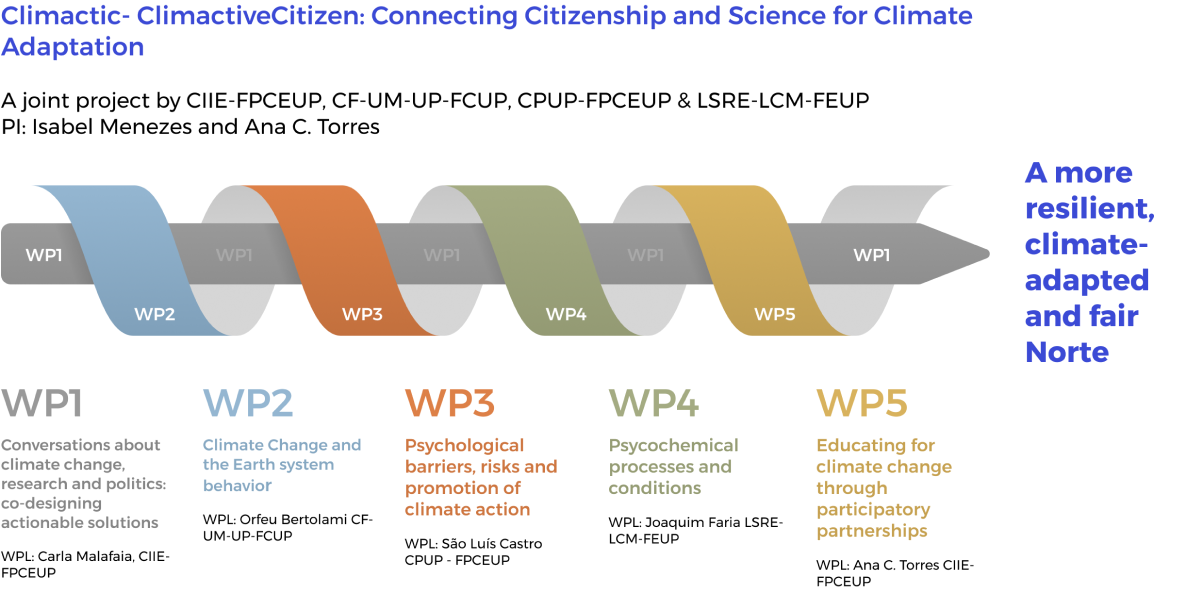01-07-2021
30-06-2023
ClimActiC was a project that brought together citizens, science and public policies in the management of adaptation to climate change, deepening knowledge about environmental challenges and the processes of behavioral and societal change, and generating spaces for communication and co-creation between scientists, young people, activists, economic agents and political decision-makers to draw up recommendations for a more resilient and adapted Northern region.
ClimActiC was developed through a partnership with nine schools in the north of the country - Caminha, Vila Nova de Cerveira, Chaves, Macedo de Cavaleiros, Vila Nova de Gaia, Vila Nova de Famalicão, Peso da Régua, Vila Verde and Frazão - with the collaboration of the respective Intermunicipal Communities, promoting local climate adaptation using young people as catalysts for processes of social and community change in their own regions.
Led by Isabel Menezes and Ana Cristina Torres, from the Centre for Research and Intervention in Education (CIIE/FPCEUP: https://www.fpce.up.pt/ciie/), ClimActiC involved the participation of four research centres at the University of Porto: Education Sciences (CIIE), Psychology (CPUP), Engineering (LSRE-LCM), and Physics (CFUM-UP).
A very important part of the ClimActiC project was based on the development of a participatory methodology which, starting from local climate problems identified by young people in the regions involved, brought together different local actors, opening up space for processes of co-creation of actionable climate solutions in the different territories. This methodology, the CiCli-Labs “Collaborative Climate Laboratories”, was developed in three sessions in each school/region, mobilizing different participatory methods (climate problem tree, local climate mapping, speed climate dating, etc.) which were based on what had already been done by the young people in previous phases of the project (identification of the climate problem and research and collection of information on the problem, for example). In each region, and depending on the type of climate problem the young people considered most relevant, the CiCli-Labs called on scientists, political decision-makers, economic agents and activists from the respective region. These actors then took part in the Lab sessions, opening up a space for communication and collaboration that allowed citizenship, public policy and science to be brought together. Some of the images of the Labs can be seen here: https://climactic.fpce.up.pt/ciclilabs/.
The climate problems identified by the young people and subsequently worked on with local agents were as relevant and wide-ranging as the flooding of the Tâmega river (in Chaves), heat islands (in Vila Verde), inefficient water management (in Macedo de Cavaleiros) and climate impacts on wine-growing (in Peso da Régua), among others.
RESEARCH TEAM:
CIIE/FPCEUP: Isabel Menezes (PI), Ana Cristina Torres (co-PI), Carla Malafaia, Amélia Lopes, Sofia Marques da Silva, Eunice Macedo, Clementina Rios, Joana Cruz, Sara Pinheiro (research fellow), Leanete Thomas Dotta, Juliana Lima (research assistant), Bruna Pereira (research assistant)
LSRE-LCM/FEUP: Joaquim Faria (WP4 leader), Cláudia Gomes da Silva, Rita Ruivo Marques, Maria José Sampaio
CPUP/FPCEUP: São Luís Castro, Isabel Rocha Pinto, Maria Adelina Barbosa, Isabel Macedo Pinto, Alessandra S. Souza, Katarina Hernandez (research assistant), Nuno Sobrinho (research assistant)
CF-UM-UP/FCUP: Orfeu Bertolami, Carmen Diego Gonçalves, Frederico Francisco

PCEP - Participation, Communities and Political Education
https://climactic.fpce.up.pt/en/projeto/
Fundo Europeu de Desenvolvimento Regional (FEDER), através do NORTE 2020 – Programa Operacional Regional do Norte (Norte2020 - Projetos Integrados ICDT). Comissão de Coordenação e Desenvolvimento Regional do Norte
NORTE-01-0145-FEDER-000071
CIIE/Faculdade de Psicologia e de Ciências da Educação da Universidade do Porto (FPCEUP), Portugal (Coord)
Laboratório de Processos de Separação e Reacção - Laboratório de Catálise e Materiais (LSRE-LCM), Faculdade de Engenharia da Universidade do Porto (FEUP)
Centro de Física das Universidades do Minho e do Porto (CF-UM-UP),
Faculdade de Ciências da Universidade do Porto (FCUP)
Centro de Psicologia da Universidade do Porto (CPUP), FPCEUP